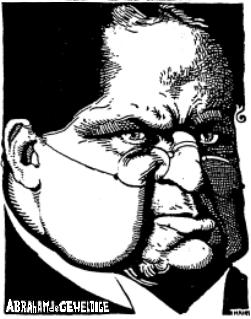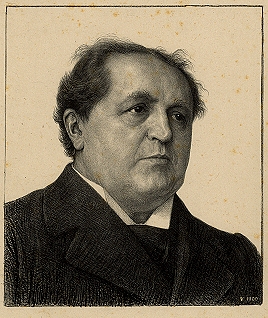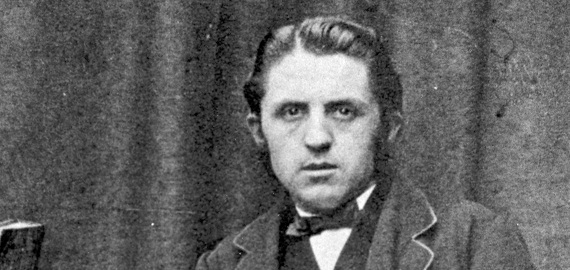 Abraham Kuyper's Encyclopedia of Sacred Theology: Its Principles is a large book that so-far-as-I-know has not been completely translated into English. Abraham Kuyper (1837-1920) is a famous Dutch Calvinist, who was Prime Minster (circa 1901-1905) of the Netherlands and wrote many books. Kuyper's most widely read book translated into English is his Lectures on Calvinism and a fairly recent popular reader Abraham Kuyper: A Centennial Reader. Kuyper is most import because he was able to implement Calvinist Theology in his Political Agenda in a synthesis rarely imitated, and in doing so, breaking ground and setting precedent towards implementing a Christian Government that we may pray comes to fruition in the future for all the World's States. (He's also an interesting character in the Two Kingdoms verse Federal Vision debates raging in your local Reformed Churches).
Abraham Kuyper's Encyclopedia of Sacred Theology: Its Principles is a large book that so-far-as-I-know has not been completely translated into English. Abraham Kuyper (1837-1920) is a famous Dutch Calvinist, who was Prime Minster (circa 1901-1905) of the Netherlands and wrote many books. Kuyper's most widely read book translated into English is his Lectures on Calvinism and a fairly recent popular reader Abraham Kuyper: A Centennial Reader. Kuyper is most import because he was able to implement Calvinist Theology in his Political Agenda in a synthesis rarely imitated, and in doing so, breaking ground and setting precedent towards implementing a Christian Government that we may pray comes to fruition in the future for all the World's States. (He's also an interesting character in the Two Kingdoms verse Federal Vision debates raging in your local Reformed Churches).
My abridged edition of Encyclopedia of Sacred Theology was published by LuLu.com and edited by B.C. Richards with an introduction by B.B. Warfield. I purchased it after reading this helpful comment on Amazon by the editor:
The Encyclopedia of Sacred Theology: Its Principles, is a large volume translated from the original three volume work in Dutch. Kuyper extensively treats theological study in terms of its objectives, methods, and relation to other branches of science, as well as how these factors evolved historically in church history. This book is also where Kuyper gives his famous treatment of the "two sciences", meaning regenerate and unregenerate. There are also helpful sections on the differences between the natural and theological sciences, specifically the effects of sin on the scientific endeavor. A good amount in this book is rather technical, in that Kuyper spends a lot of time on etymology, but there is still a lot of material here that should be of interest to the thoughtful Christian lay-audience. I found it helpful enough that I went to the trouble to edit it for publication. The technical sections are easy to skip. As you may know, Kuyper was very influential in the development of conservative, Reformed Christianity in the 20th century on such thinkers as, for instance, Cornelius Van Til, and The Encyclopedia of Sacred Theology is often referenced by such theologians as Bavinck, Van Til, and Gaffin. Check it out for free at ReformedAudio dot org. - B. C. Richards (Amazon.com)
 (Here is a mirror to the PDF of the book mentioned by the author. )
(Here is a mirror to the PDF of the book mentioned by the author. )
Even the abridged version may be a bit dry, because it begins with a long polemic for Encyclopedias and some etymology for the word 'encylopedia' that is defined a the circle of knowledge, along with some arguments for various circles of knowledge from a general encyclopedia to a specific encyclopedia. Kuyper's comparison between general botany of plants to specific knowledge of roses exemplifies his analogy well:
In this sense this acquired conception applies as well to general Encyclopedia as to Encyclopedia of special departments, even though it lies in the nature of the case that general Encyclopedia, because it is general, limits itself to the principal ramifications of the organism of science, and leaves the detailed ramifications of each group and its subdivisions to the study of special Encyclopedia. General Botany has nothing to do with the variations of the species rosa into tree roses, monthly roses, provincial roses, or tea roses. (pg31)
The first 150 pages is a long polemic for Encyclopedic organization of knowledge, with extended analysis of the difference between Science and Knowledge that develops into Kuyper's answer to whether Theology is a Science, and how sin affects Man's ability to engage Science faithfully. This extended section has been abridged, maybe for good reasons as this one volume book is an introduction, and because Kuyper uses many mundane metaphors that do not necessarily advance his argument. Within the myriad of pages are many gems like this affirmation of the Reformed Anthropological position of Dichotomy against the classical Greek Trichotomy:
One objection only can be raised. From the view-point of the Trichotomists it can be asserted that man does not consist of body and soul, but of body, soul, arid spirit, and that it is therefore entirely rational, by the side of a faculty for the body and a faculty for the soul, to place a third faculty, which has the spirit (πνεύμα) of man for its object, and that this should be the Theological. Thus next to a Somatology and a Psychology, there should also be a Pneumatology as “Dritte im Bunde.” This objection, however, cannot stand. The organism of science cannot be analyzed, or, if you please, divided, according to the measure of a distinction accepted only by a single school, but disputed by other schools, and finding no echo in the universal human sense. With all the Reformed we reject the Trichotomy, at least in so far as it assumes three substances in man. We are Dichotomists. Even if the distinction between soul and spirit (ψυχή and πνεύμα) were able to maintain itself to a certain extent, body, soul, and spirit could never be coordinated. But the antithesis should be between body and soul, and within that soul the distinction between the psychical and the pneumatical should be sought. Even they who speak of a faculty of the Science of Religion are well aware that nothing can be done with the pneuma as such, wherefore they have thrown themselves upon religion, as being a very complicated expression of life and rich in phenomenal life. The pneumatical per se would not be capable of investigation to any considerable extent. Hence along this way there is no possibility of pointing out a proper ground in the object of general science for a science of Theology, and there can be no question of a Theological faculty. Both are possible only when you come to the antithesis of self-conscious man and his God, so that you find the object of your faculty not in religion, but in God. (pg 150-151)
When Kuyper became Prime Minister, he left his post as Chair of Systematic Theology to Herman Bavinck. Kuyper's Encyclopedia of Sacred Theology is a bridge to the widely famous and renown Gereformeerde Dogmatiek (Reformed Dogmatics 4vols.) published by Bavinck. Kuyper's Encyclopedia explains the necessity of Encyclopedia works that stand between Alphabetical Lexicons and general Dogmatics, and has broadened my understanding of another form of Theology that exists as a transitional form between Lexicons and Systematic Theologies.




Leave a comment